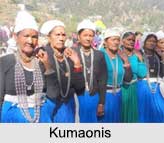 Kumaonis are a Hindu Community who hails from Uttarakhand. They have a rich tradition of folk music and art and a high percentage of literacy with a long tradition of learning and education. Kumaon covers the districts of Nainital, Almora and Pithoragarh in Uttarakhand, which came into being in 1814 AD when the British overcame the Chand Rajas.
Kumaonis are a Hindu Community who hails from Uttarakhand. They have a rich tradition of folk music and art and a high percentage of literacy with a long tradition of learning and education. Kumaon covers the districts of Nainital, Almora and Pithoragarh in Uttarakhand, which came into being in 1814 AD when the British overcame the Chand Rajas.
Origin of Kumaonis
The original Kumaonis were Vedic Aryans or Nordic. Kumaonis have their own dialect based on Hindi with marginal phonetic variations in different regions. The Kumaoni dialect is very famous in Uttarakhand which is spoken by the people of Kumaon.
History of Kumaonis
Legend had it that during the prehistoric era, the Kinnaurs, Kiratas, the Khas and the Vedic Aryans were the rulers of this area. During the Vardhan Empire this area was under its influence. For two centuries after Harshavardhana, the region was ruled by the Tibetans. In the middle ages, the Katyur dynasty ruled the area for over a century. Anek Mali, a Nepalese, invaded Kumaon in 1191. Two centuries later the Chand Rajas ruled over the area till they were defeated by the Gurkhas around 1790 and in 1815 the British annexed Kumaon and established themselves in this region. The community also played a prominent role in the freedom struggle and produced some notable national leaders.
Society of Kumaonis
 The social set up of the Kumaonis are still traditional. Marriages are arranged with the consent of the parents and several customs have been assigned to celebrate different ceremonies like the thread ceremony of a boy or to the birth of a male child.
The social set up of the Kumaonis are still traditional. Marriages are arranged with the consent of the parents and several customs have been assigned to celebrate different ceremonies like the thread ceremony of a boy or to the birth of a male child.
Religion of Kumaonis
Kumaonis celebrate all the main Hindu festivals like Holi, Diwali, Janmashtami, Raksha Bandhan and Dussehra. There are a number of fairs connected with religious festivals which are celebrated in different parts of the region - Makar Sankranti at Jageshwar, Bageshwar, and Thai; Janmashtami at Devidhura; Nandashtami or Nanda Devi Fair at Almora, Nainital and Pithoragarh and Vrishchik Sankranti at Jauljibi. The Nanda Devi Fair is celebrated only in Kumaon. In Nainital and Almora there are temples dedicated to Nanda (Parvati), the family Goddess of the Chand rajas.
Profession of Kumaonis
The people of Kumaon are honest, hardworking and are concerned about their self esteem. Agriculture and trade in timber are their main occupations.




















